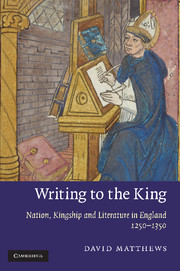
-
Select format
-
- Publisher:
- Cambridge University Press
- Publication date:
- May 2010
- April 2010
- ISBN:
- 9780511676079
- 9780521111379
- 9781107412545
- Dimensions:
- (228 x 152 mm)
- Weight & Pages:
- 0.53kg, 242 Pages
- Dimensions:
- (229 x 152 mm)
- Weight & Pages:
- 0.33kg, 242 Pages
- Series:
- Cambridge Studies in Medieval Literature (77)
You may already have access via personal or institutional login- Series:
- Cambridge Studies in Medieval Literature (77)
Book description
In the century before Chaucer a new language of political critique emerged. In political verse of the period, composed in Anglo-Latin, Anglo-Norman, and Middle English, poets write as if addressing the king himself, drawing on their sense of the rights granted by Magna Carta. These apparent appeals to the sovereign increase with the development of parliament in the late thirteenth century and the emergence of the common petition, and become prominent, in an increasingly sophisticated literature, during the political crises of the early fourteenth century. However, very little of this writing was truly directed to the king. As David Matthews shows in this book, the form of address was a rhetorical stance revealing much about the position from which writers were composing, the audiences they wished to reach, and their construction of political and national subjects.
Reviews
'… this book is to be welcomed for its ambitious contribution to the history of political writing in the century before the great Ricardian poets.'
Source: The Review of English Studies
'David Matthews’s new book constitutes an important and stimulating contribution to and extension of the burgeoning scholarship on the literary manifestations of a ‘public sphere’ in high and late medieval England … Matthews has given us a monograph of uncommon erudition, insight, and acumen. Writing to the King represents an important step forward in the understanding of English political thought as reflected through the literary artifacts of the later Middle Ages. All scholars - whether of a literary or historical bent - interested in the complex interplay between writing and politics in medieval England are in his deepest debt.'
Cary J. Nederman Source: Modern Philology
'Writing to the King is a valuable contribution, challenging the usual periodizations, and constructing a coherent narrative of ideological development over the century, across some interesting writings which have hitherto suffered from relative neglect.'
Laura Ashe Source: Medium Aevum
Contents
Metrics
Altmetric attention score
Full text views
Full text views help Loading metrics...
Loading metrics...
* Views captured on Cambridge Core between #date#. This data will be updated every 24 hours.
Usage data cannot currently be displayed.
Accessibility standard: Unknown
Why this information is here
This section outlines the accessibility features of this content - including support for screen readers, full keyboard navigation and high-contrast display options. This may not be relevant for you.
Accessibility Information
Accessibility compliance for the PDF of this book is currently unknown and may be updated in the future.


